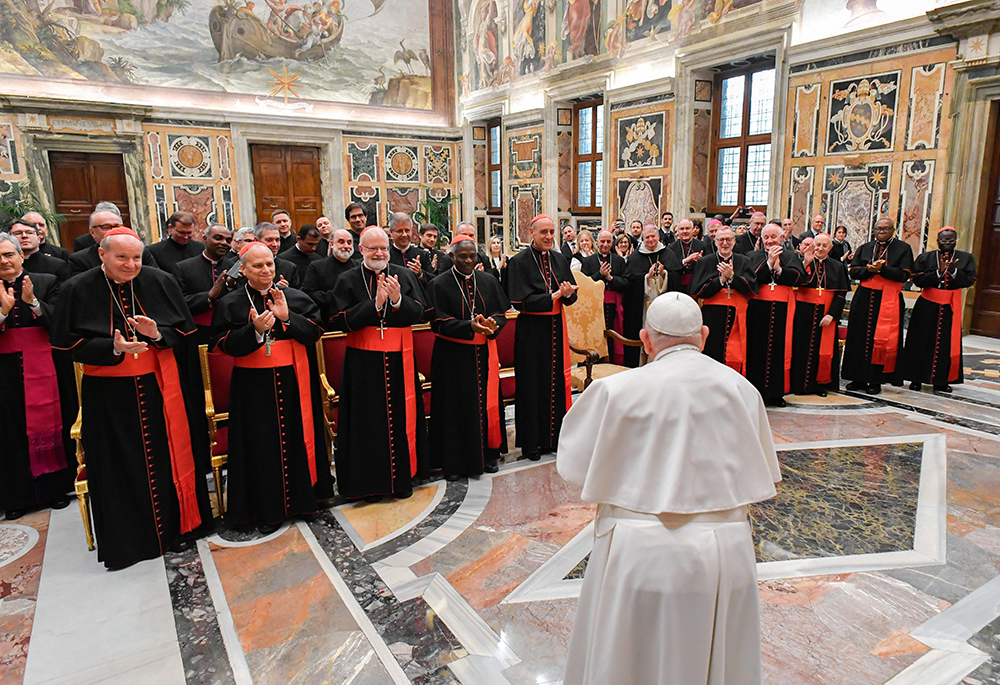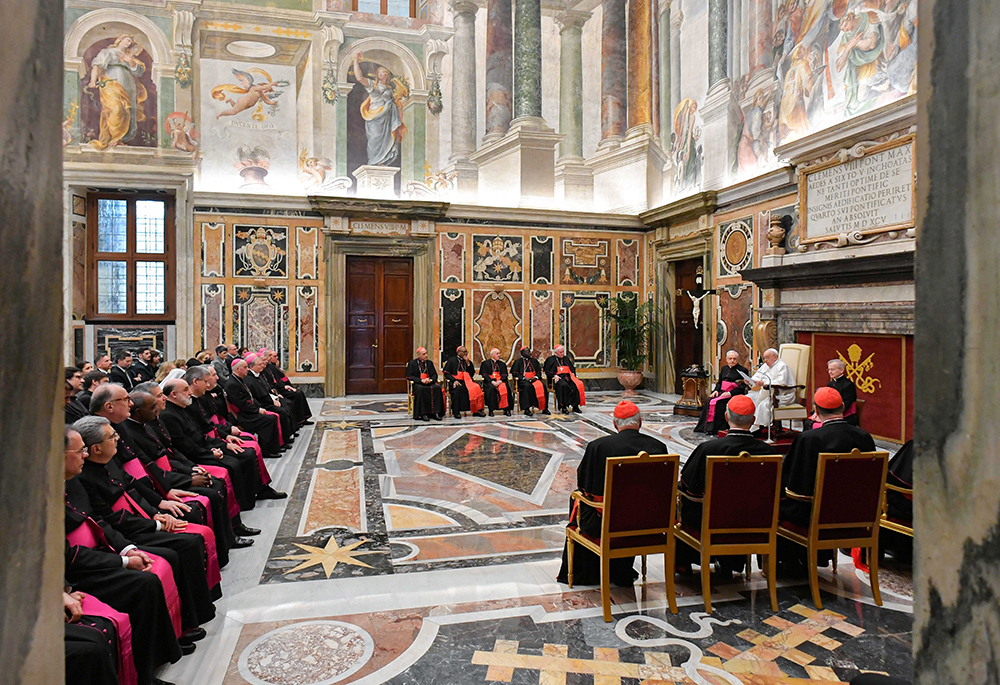
Pope Francis meets members of the Dicastery for the Doctrine of the Faith in the Apostolic Palace Jan. 26 at the Vatican. In the front row from left are: Cardinals Christoph Schönborn, Robert Prevost, Seán O'Malley, Peter Turkson, Victor Manuel Fernández, Claudio Gugerotti, Marc Ouellet, Fernando Filoni, John Onaiyekan and Stephen Mulla. (CNS/Vatican Media)
The pope gave a short but important speech to the full membership of the Dicastery for the Doctrine of the Faith last week. Most of it was excellent but there was one glaring omission.
First the good stuff. The pope used the occasion (Jan. 26) to clarify his intentions in approving the document Fiducia Supplicans in December, specifically as it relates to the blessing of persons who are in same-sex unions or other irregular unions. He emphasized that "these blessings, outside of any liturgical context and form, do not demand moral perfection to be received." Blessings, like Holy Communion, are not a reward for the perfect but food for the journey.
The pope reemphasized the point in an interview with La Stampa. In response to those who object that persons in a same-sex union are living in an objectively sinful situation, the pope replied, "But we are all sinners. Why then draw up a list of sinners who can enter the church and a list of sinners who cannot be in the church? This is not the Gospel."
Any fair reading of the Gospel would find it strange that sexual sins have achieved such a prominent place in people's understanding of sin. How we treat the poor and the migrants should surely garner as much focus but I do not hear anyone at EWTN complaining that the church should not offer a blessing to, say, Rep. Elise Stefanik because she defends views on immigration that can accurately be described as inhumane and fascistic. I hope the congresswoman takes Communion as often as possible and I hope the grace the sacrament confers will help her to see the light and correct her ways.
The Holy Father was also right to insist that "Inasmuch as we are Christians, we must not tire of insisting 'on the primacy of the human person and the defence of his or her dignity beyond every circumstance,' " quoting Laudate Deum. Our sins degrade our human dignity but they do not remove it. Grace, the grace of the cross, removes the sins and grounds the dignity of the human person. The foundational divergence between this pope and his critics is that he insists God's grace is at the heart of the Christian story, and they insist that human sinfulness, usually someone else's sins by the way, is the heart of the story. The pope is right. Unambiguously right.

Pope Francis speaks to members of the Dicastery for the Doctrine of the Faith at the end of their plenary assembly Jan. 26 at the Vatican. (CNS/Vatican Media)
But not exhaustively right. Just as it is remarkable that a certain kind of conservative Catholic considers sexual sins uniquely antithetical to Christian life, it is also astounding that a certain kind of liberal Catholic thinks shedding traditional sexual mores is the very measure of Christian fidelity. It is not that one is right and the other wrong. It is that we all need to move beyond the conviction that pelvic theology is uniquely, comprehensively, and radically, the most important mark of Christian faith.
More importantly, the pope structured his short talk around three themes: sacraments, dignity and faith. Like Vatican II itself, he started with consideration of the sacraments. "In these days you have reflected on the theme of the validity of the sacraments," the pope said. "The life of the church is nourished and grows through them. For this reason, special care is required on the part of ministers in administering them and in disclosing to the faithful the treasures of grace they communicate." Again, the emphasis is on grace, on God's activity, and how it nourishes us, not on how we build up or tear down the faith.
His comments about human dignity also reflected a key insight into this pontificate and those who oppose it. Reread the words already cited: "Inasmuch as we are Christians, we must not tire of insisting 'on the primacy of the human person and the defence of his or her dignity beyond every circumstance.' " How often do we fall short of this when we speak against our brothers and sisters in the faith? And, how often do debates about controversial issues reflect the degree to which one or both sides ignore the dignity of those with whom they contend?
Advertisement
The third word was "faith" and the pope began his treatment of it by saying, "In this regard, I would like to remember two events." The events were the 10th anniversary of his programmatic apostolic exhortation Evangelii Gaudium and the forthcoming Jubilee year 2025. A key point of convergence among post-conciliar popes is this understanding that Catholic faith is rooted in the event of Jesus Christ, not in a series of propositions. Alas, some who invoke the memory of Popes John Paul II and Benedict XVI fail to grasp this, as do some who invoke Pope Francis. We Catholics can and should be protected from lapsing into ideology by the words we pray every day: "Blest is the fruit of thy womb, Jesus."
What did the pope omit from his talk? He should have addressed the lack of consultation before Fiducia Supplicans. When you spend the better part of two months having to issue clarifications, you know you needed to do a better job preparing the text, or at least preparing the bishops of the world to receive the text. Consultations on major issues are vital and, in this instance, they did not happen.
The pope is free to approve documents and to make decisions as he sees fit. He is the universal pastor of the church. But if he wants the rest of us to embrace synodality, he should insist that the dicasteries that help him govern the church act in a more synodal fashion. The central themes of his pontificate can withstand the arrows shot at them from his opponents. But he needs to make sure he and his allies do not make avoidable, unforced errors.








